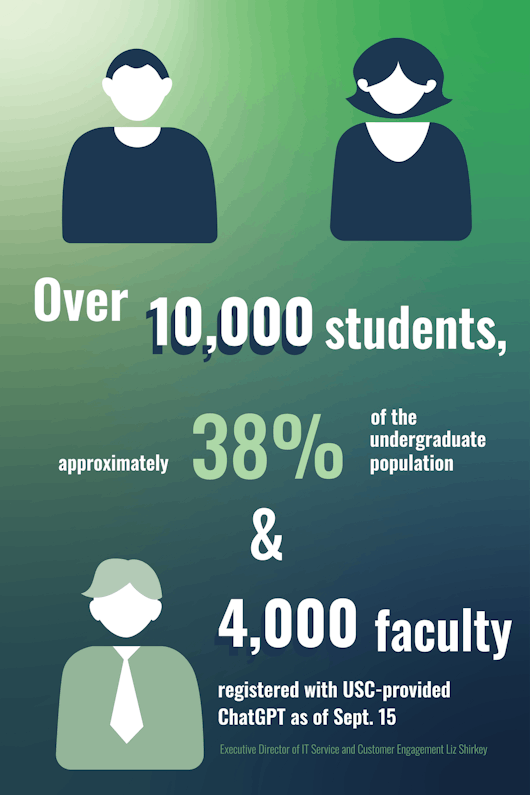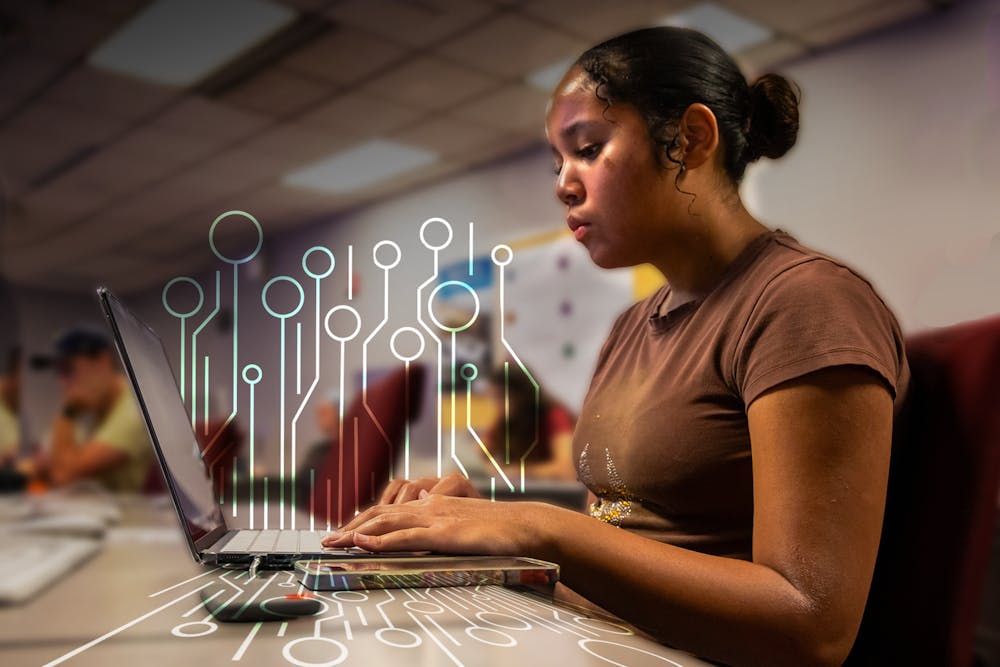Over 10,000 students, approximately 38% of the undergraduate population, and 4,000 faculty have registered with USC-provided ChatGPT as of Sept. 15, Executive Director of IT Service and Customer Engagement Liz Shirkey said.
At the beginning of the school year, USC’s Department of IT announced the university's partnership with OpenAI to provide free access to ChatGPT for all students, faculty and staff.
Student usage
The Daily Gamecock interviewed 40 students and found that 43% had signed up to use university-offered ChatGPT programs.
Third-year civil engineering student Chase Staley uses university-provided ChatGPT “a couple times a week” and is hesitant to use it more than that.

“Putting your whole faith in AI is something that you probably just shouldn't do, especially around engineering, when it's (something) that takes people's lives into consideration,” Staley said. “I'd rather have myself do the calculation, rather than be reliant on AI to do it.”
First-year political science student Benjamin Nguyen, who hasn’t used university-offered ChatGPT, said it should only be offered to specific majors such as those in STEM fields. He compared potential ChatGPT access for STEM majors to the College of Information and Communications’ access to tools in the Adobe Creative Cloud, such as Photoshop.
Nguyen does not support using AI for writing-heavy fields such as political science, he said.
“I just feel like (AI) kind of takes away from the human aspect of it,” Nguyen said. “I don't like AI in writing. I don't like AI in art, anything creative, anything that's related to humanities. I just feel like it takes away from that.”
However, fourth-year film and media studies student Lucky Jones said AI could provide endless ideas in creative fields.
“You have a person to bounce ideas off of in your pocket at all times,” Lucky Jones said. “And we've also seen amazing things on the visual end too … We're at a point now where we can take a regular video, say, even out here, and change your background from the Horseshoe to the top of Mount Everest, so it’s making waves. I can't even imagine what it's going to do later.”
Out of the 17 students who said they had used USC's ChatGPT, six said they primarily used it to create practice problems or study guides to prepare for quizzes and exams.
First-year aerospace engineering student Noah Elliott said he uses AI to provide him with example problems and simplified explanations.
Out of the 23 students interviewed who had not used USC's ChatGPT, 48% said they hadn’t done so because they already had personal ChatGPT or other AI chatbot accounts they used for schoolwork.
“I don't necessarily use ChatGPT unless I need help defining some big words, to be honest,” graduate business analytics student Sriya Chalasani said. “I didn't find a way that I needed to use the USC-provided one. The free one gets it done.”
Second-year broadcast journalism student Ian Jones said the presence of AI in higher education isn't likely to diminish.
“It's inevitable because of the growth of it,” Ian Jones said. “You just have to make your enemy your best friend at this point and start giving it to students and understand that it should be used as supplemental help for students.”
As AI becomes increasingly ingrained in education, fourth-year cyber policy and ethics student Allison Chipps said ethical concerns may arise due to lack of comprehensive regulations and ethical guidelines.
“It's really a gray area right now because there are so many laws and regulations that have not been made for AI,” Chipps said. “I think that as universities, schools (and) people in general start to use it more, they need to come out with ways that are not going to allow AI to be used in ways that it should not be used because it is still so new.”
AI in the classroom
From English to computer science, professors are implementing USC ChatGPT in their classrooms across disciplines and in a variety of ways.
Associate English Language Professor Michael Gavin has embraced AI in his classroom. This semester, Gavin is teaching a special topics English class that focuses on the linguistic foundations of AI.
“I really believe that you can’t understand (AI) theoretically unless you also have a practical sense of how it works,” Gavin said. “I want to make sure the students get lots of experience … There’s both an intellectual foundation, but then also the practical hands-on element.”
Gavin also created a custom GPT for his students to use in his Enlightenment literature class, he said. Dubbed Scriblerus, it is the fifth-most-popular GPT within the USC ChatGPT system as of Sept. 29. Gavin encourages his students to work with Scriblerus as a tutor, he said.
Sharon Gumina, an information technology instructor, said she permits students to use AI in her programming classes but requires them to acknowledge they used AI and disclose all their interactions with the chatbot.
“What I’m trying to teach students is you need to be transparent when you use AI to prepare them for the workplace,” Gumina said.
Gumina said ChatGPT has also been helpful in identifying mistakes in her students’ programming, as it finds bugs in their code quicker and streamlines their work.
“You don’t see your mistakes as rapidly as somebody else will. So now, instead of having to rely on another human being, … they can go to AI to help them with debugging,” Gumina said. “In the old days before AI, we could sit and stare at our screen for eight hours and not be able to identify an error … So it has reduced frustration and allowed them to focus more on learning.”
As someone with over 30 years of experience in cybersecurity, Gumina said AI is just another emergent technology, and it's her job as an educator to “foster the appropriate usage” of AI.
“In this industry, emergent technologies have occurred multiple times,” Gumina said. “It’s just another technology. It’s not going to be able to replace human creativity and our ability to visually process ... It’s more of an assistance to me, and I don’t think we’re going to stop it.”
From administration

The university decided to provide students with free ChatGPT access to level the playing field and provide equal access to a normally paywalled service, Shirkey said.
“The president and the board felt like it was really important that all of our students have access, and equal access, to an AI tool,” Shirkey said. “Employers are really looking for AI fluency and literacy in graduates, and it's really important to us that our students have equal access to that.”
Shirkey also touched on the security issues posed by inputting sensitive USC data and intellectual property into ChatGPT servers outside the university, which OpenAI can use to train their large language models.
“Using the USC account ensures that your data isn't being used to train models, which some of us have varying degrees of privacy concerns (about),” Shirkey said. “For me, I really don't like tools that train on my data, so I prefer to use the USC tool. I would really focus on the security and the privacy aspects of it if there were students who were on the fence about using the USC-provided account.”
According to USC’s contract with OpenAI, the company will not be able to view, store, monitor or use data entered into the USC servers to train their large language models.
USC’s board of trustees unanimously adopted a set of principles for AI use in education at of its Sept. 26 meeting, according to a press release from the university. The statement pledged to uphold high ethical standards for academic use of AI, including “protecting the privacy and intellectual property of our community of users while ensuring the preservation of academic integrity in the classroom.”
Gavin said he had designed his class prior to USC's deal with OpenAI, but he was able to use USC's ChatGPT platform for his English classes.
"It made my work a lot simpler to have a system where I could create stuff and share it with (students), and it would all be both free and have a little bit better privacy protection," Gavin said.

